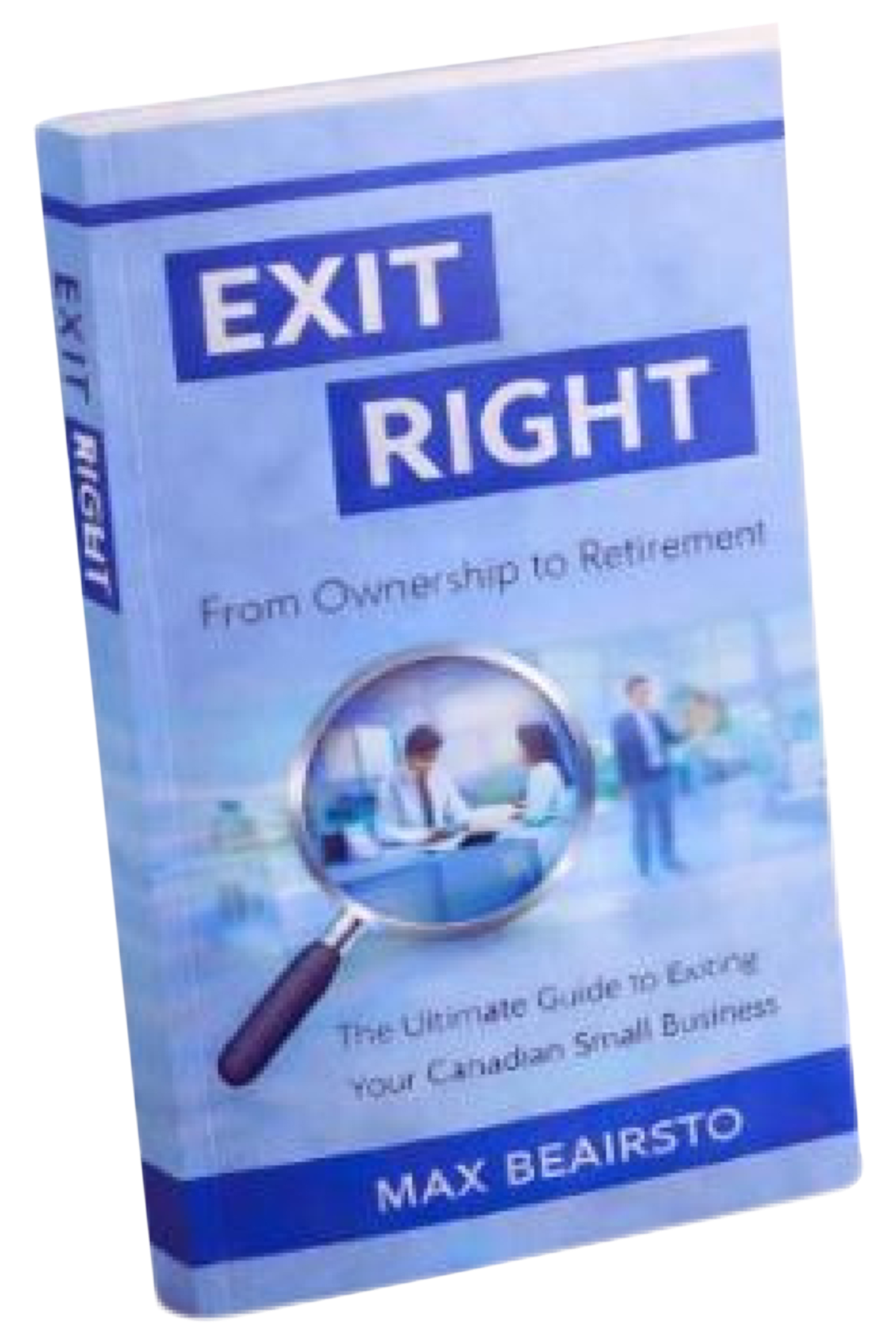August 22, 2025

Business owners who remain actively engaged throughout the exit process consistently achieve more successful outcomes than those who adopt a hands-off approach. While it may seem tempting to delegate everything to advisors and hope for the best, your direct involvement remains crucial for maximizing value and ensuring a smooth transition.
Just as experienced pilots never rely solely on autopilot during critical takeoff and landing phases, successful business owners maintain active control during the most important aspects of their exit journey. Your expertise, industry knowledge, and strategic oversight cannot be replaced by even the most qualified advisors.
The Foundation of Strategic Exit Planning
Achieving a profitable business exit requires comprehensive preparation that begins years before you’re ready to sell. Success stems from methodical planning, sustained engagement, and a thorough understanding of your business’s unique value drivers.
Many business owners make the critical mistake of waiting until retirement looms before considering their exit strategy. This reactive approach often leads to rushed decisions, suboptimal valuations, and missed opportunities for value enhancement. The most successful exits begin with deliberate preparation, allowing owners to optimize operations and position their companies for maximum market appeal.
Research consistently demonstrates that businesses with engaged owners throughout the exit process command higher multiples and experience fewer transaction complications. When you maintain active involvement, you retain control over critical decisions that directly impact your final return on investment while building buyer confidence in the transition process.
Understanding Your Business’s True Market Value
One of the most significant advantages of staying actively involved is developing a comprehensive understanding of your business’s actual market value. Professional valuations provide essential baseline information, but your intimate knowledge of operations, customer relationships, and growth potential adds crucial context that influences final negotiations.
Active owners can identify and articulate value drivers that external advisors might overlook. You understand the nuances of customer loyalty programs, the strength of long-term vendor partnerships, and the potential for operational improvements that could significantly enhance profitability. This knowledge becomes invaluable during buyer presentations and due diligence processes.
Furthermore, when you remain engaged in the valuation process, you can implement strategic improvements that enhance your business’s attractiveness to potential buyers. These targeted enhancements often yield returns that far exceed the initial investment in time and resources, creating measurable value that directly translates to higher sale prices.
The Preparation Advantage: Building Exit Readiness
Preparation separates successful exits from disappointing outcomes. Active business owners who dedicate substantial time to preparing their companies for sale typically achieve valuations 20-30% higher than those who enter the market unprepared.
Effective preparation encompasses multiple interconnected components. Financial records must be meticulously organized and transparent, operational processes require comprehensive documentation and standardization, and key personnel should demonstrate the capability to maintain business continuity during ownership transition.
This preparation extends beyond internal operations to include market analysis and strategic positioning. Understanding industry trends, competitive dynamics, and economic conditions enables you to time your exit strategically and position your business advantageously within the marketplace.
Active owners also recognize the importance of addressing potential buyer concerns before they arise. This proactive approach might involve diversifying customer concentration, strengthening management teams, or improving operational efficiency metrics that buyers scrutinize closely.
Building Collaborative Advisory Relationships
While your active involvement is essential, successful exits also require strong professional support. The key lies in building collaborative relationships with advisors rather than simply delegating responsibility and stepping back from the process.
Effective business owners work closely with experienced business brokers, certified public accountants, attorneys specializing in mergers and acquisitions, and other professionals to develop comprehensive exit strategies. You contribute operational knowledge and strategic vision while advisors provide specialized expertise and market experience.
When you remain actively involved, you can better evaluate advisor recommendations and make informed decisions about proposed strategies. You understand the practical implications of various approaches and can assess whether recommended tactics align with your specific goals and operational constraints.
This collaborative approach ensures that your exit strategy reflects both professional expertise and intimate business knowledge, creating a more robust and effective plan for achieving optimal outcomes.
Maintaining Business Performance During Transition
One of the most significant challenges during the exit process involves maintaining consistent business performance while managing the demands of a potential sale. Active owners who successfully navigate this challenge protect their business value and maintain buyer confidence throughout extended negotiations.
Buyers scrutinize financial performance closely, particularly during the most recent periods leading up to sale discussions. Any decline in revenue, profitability, or operational efficiency can significantly impact valuation and negotiating position. Active owners monitor these critical metrics closely and implement immediate corrective measures when necessary.
Additionally, maintaining performance requires managing the natural uncertainty that accompanies ownership transition discussions. Employees, customers, and vendors may have concerns about potential changes under new ownership. Active owners address these concerns proactively through clear communication and consistent leadership, maintaining stability and confidence throughout the process.
This ongoing attention to business fundamentals demonstrates to potential buyers that the company can continue performing well during transition periods, reducing perceived risk and supporting premium valuations.
Navigating Complex Transaction Negotiations
Business sales involve intricate negotiations that extend far beyond simple discussions of the purchase price. Deal structure, payment terms, escrow arrangements, transition timelines, and post-sale involvement requirements all demand careful consideration and strategic decision-making.
Active owners who thoroughly understand their business operations and strategic value position themselves to negotiate more favourable terms across all aspects of the transaction. You can assess the feasibility of proposed transition schedules, evaluate the reasonableness of buyer requests for operational changes, and identify potential deal complications before they become serious problems.
Your active involvement also demonstrates commitment to ensuring a successful transition, which often translates into more favourable deal terms and greater buyer confidence in the transaction’s ultimate success. Buyers prefer working with engaged sellers who can provide detailed operational insights and support smooth ownership transfers.
Mastering the Due Diligence Process
Due diligence represents one of the most critical phases of any business sale, requiring an extensive review of documentation and operational analysis. Active owners who maintain organized records and transparent operations navigate this process more efficiently, thereby maintaining transaction momentum.
Your comprehensive knowledge of business operations becomes invaluable during due diligence investigations. You can provide essential context for financial variations, explain operational decisions that might appear unusual to outside reviewers, and address buyer concerns with confidence and authority.
Preparation for due diligence should begin well in advance of any sale discussions. Active owners maintain organized financial records, thoroughly document operational procedures, and ensure compliance with all relevant regulations. This systematic approach demonstrates professionalism and reduces buyer uncertainty about potential operational or legal risks.
Efficient due diligence processes also help maintain deal momentum and prevent buyer fatigue that can lead to renegotiation attempts or transaction failures.
Maximizing Return on Investment
The ultimate objective of any business exit involves maximizing your return on investment while ensuring a smooth operational transition. Active owners consistently achieve superior results because they understand and can optimize all factors that influence business value and buyer appeal.
Financial optimization extends beyond simply improving current profitability metrics. Active owners identify and implement strategic improvements that enhance long-term value and attractiveness to potential buyers. These improvements might include diversifying customer bases, strengthening management capabilities, expanding into complementary markets, or improving operational efficiency ratios.
Operational optimization focuses on creating systems and processes that can function effectively under new ownership. Buyers consistently pay premiums for businesses that demonstrate operational excellence and management independence. Active owners invest strategically in these improvements, understanding they will yield significant returns during the exit process.
Strategic Post-Sale Transition Planning
Successful business exits often require some level of post-sale involvement from previous owners to ensure continuity and knowledge transfer. Active owners who plan comprehensively for this transition phase can negotiate more favourable terms while providing better outcomes for all stakeholders involved.
Effective transition planning should address operational continuity requirements, key employee retention strategies, customer relationship management, and systematic knowledge transfer processes. Your active involvement in developing these detailed plans demonstrates commitment to transaction success and often results in more attractive deal structures.
Understanding your preferred level of post-sale involvement also helps guide buyer selection and deal negotiation strategies. Some owners prefer complete disengagement immediately following closing, while others welcome ongoing advisory or consulting relationships. Clarity about your preferences enables more targeted marketing approaches and negotiation tactics.
Taking Action for Exit Success
The evidence consistently demonstrates that active business owners achieve significantly better exit outcomes compared to those who adopt passive approaches to the sale process. Your sustained engagement throughout the process protects your investment, maximizes achievable value, and ensures smoother transitions for all stakeholders.
Begin by conducting a comprehensive assessment of your business’s current state and exit readiness. This evaluation should identify specific areas requiring improvement and establish systematic plans for addressing these enhancement opportunities. Remember that exit preparation represents an ongoing process rather than a one-time event.
Build strong relationships with qualified advisors who understand your industry dynamics and share your commitment to achieving optimal results. Collaborate closely with these professionals while maintaining active oversight of all strategic decisions affecting your exit timeline and objectives.
Develop detailed financial projections that demonstrate your business’s growth potential and sustainability under new ownership. These projections should reflect realistic assumptions while highlighting opportunities for continued expansion and profitability improvement.
Most importantly, recognize that successful exits require substantial time investment, comprehensive planning, and dedicated effort over extended periods. The investment you make in active preparation and sustained engagement will yield substantial returns when you’re ready to complete the ownership transition and move forward to your next chapter.
Your business represents years of hard work, strategic decisions, and personal sacrifice. By remaining actively involved throughout the exit process, you ensure this investment receives the attention and expertise it deserves, ultimately achieving the profitable and successful transition you have worked diligently to earn.
The path to a successful business exit requires your direct involvement, strategic planning, and collaborative relationships with qualified professionals. With this balanced approach, you can navigate the complexities of business ownership transition while maximizing value and ensuring continued success under new ownership.




